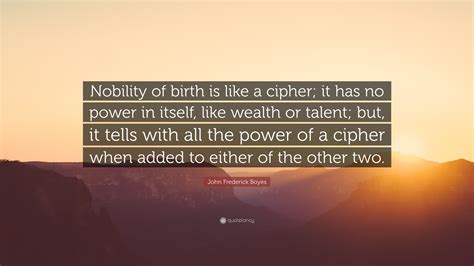A Quote by John Frederick Boyes
There is scarcely a man who is not conscious of the benefits which his own mind has received from the performance of single acts of benevolence. How strange that so few of us try a course of the same medicine!
Related Quotes
According to the technical language of old writers, a thing and its qualities are described as subject and attributes; and thus a man's faculties and acts are attributes of which he is the subject. The mind is the subject in which ideas inhere. Moreover, the man's faculties and acts are employed upon external objects; and from objects all his sensations arise. Hence the part of a man's knowledge which belongs to his own mind, is subjective: that which flows in upon him from the world external to him, is objective.
There are always so many things happening [to us] at one time. We read Isherwood's A Single Man in class, and we had to ask: How is he talking about all this stuff: teaching, being lonely, all his memories, all at the same time? He's telling us: This is where my head is at, let me be straightforward. And of course, try be artful about it.
There is scarcely a single joy or sorrow within the experience of our fellow-creatures which we have not tasted; yet the belief, in the good and beautiful has never forsaken us. It has been medicine to us in sickness, richness in poverty, and the best part of all that ever delighted us in health and success.
Knowledge is inherent in man; no knowledge comes from outside; it is all inside. We say Newton discovered gravitation. Was it sitting anywhere waiting for him? It was in his own mind; the time came and he found it out. All knowledge that the world has ever received comes from the mind; the infinite library of the universe is in our own mind. The external world is simply the suggestion, the occasion, which sets you to study your own mind.
These men, in teaching us how to die, have at the same time taught us how to live. If this man's acts and words do not create a revival, it will be the severest possible satire on the acts and words that do. It is the best news that America has ever heard.... How many a man who was lately contemplating suicide has now something to live for!
Nothing can tend so much to humble us before the mercy and justice of God as the consideration of His benefits and our own sins. Let us, then, consider what He has done for us, and what we have done against Him; let us call to mind our sins in detail, and His gracious benefits in like manner, remembering that whatever there is of good in us is not ours, but His, and then we need not be afraid of vainglory or of taking complacency in ourselves.
Many concerns now make part or the whole of their dividends from by-products that formerly went to waste. How do we, as individuals, utilize our principal by-product? Our principal by-product is, of course, our leisure time. Many years of observation forces the conclusion that a man's success or failure in life is determined as much by how he acts during his leisure as by how he acts during his work hours. Tell me how a young man spends his evenings and I will tell you how he is likely to spend the latter part of his life.
The mind never need stop growing. Indeed, one of the few experiences which never pall is the experience of watching one's own mind and how it produces new interests, responds to new stimuli, and develops new thoughts, apparently without effort and almost independently of one's own conscious control.
The purpose of life seems to be to acquaint a man with himself and whatever science or art or course of action he engages in reacts upon and illuminates the recesses of his own mind. Thus friends seem to be only mirrors to draw out and explain to us ourselves; and that which draws us nearer our fellow man, is, that the deep Heart in one, answers the deep Heart in another, - that we find we have (a common Nature) - one life which runs through all individuals, and which is indeed Divine.
Clearly, what God wants above all is our will which we received as a free gift from God in creation and possess as though our own. When a man trains himself to acts of virtue, it is with the help of grace from God from whom all good things come that he does this. The will is what man has as his unique possession
It is not indeed certain, that the most refined caution will find a proper time for bringing a man to the knowledge of his own failing, or the most zealous benevolence reconcile him to that judgment by which they are detected; but he who endeavours only the happiness of him whom he reproves will always have either the satisfaction of obtaining or deserving kindness; if he succeeds, he benefits his friend; and if he fails, he has at least the consciousness that he suffers for only doing well.
When I find that so much of my life has stolen unprofitably away, and that I can descry by retrospection scarcely a few single days properly and vigorously employed, why do I yet try to resolve again? I try, because reformation is necessary and despair is criminal. I try, in humble hope of the help of God.
Man ordinarily is a robot. He lives apparently awake, but not really. He walks, he talks, he acts, but it is all as if in sleep - not conscious of what he is doing, not conscious of what he is saying, not conscious of all that surrounds him. He moves surrounded in a dark cloud of unawareness. According to Gautama the Buddha, this is the original sin: to live unconsciously, to act out of unconsciousness. In fact, the word 'sin' comes from a root which means forgetfulness. Sin simply means that we are not conscious, aware, alert, that we don't have any inner light to guide us.
I believe that the unity of man as opposed to other living things derives from the fact that man is the conscious life of himself. Man is conscious of himself, of his future, which is
death, of his smallness, of his impotence; he is aware of others as others; man is in nature, subject to its laws even if he transcends it with his thought.






























